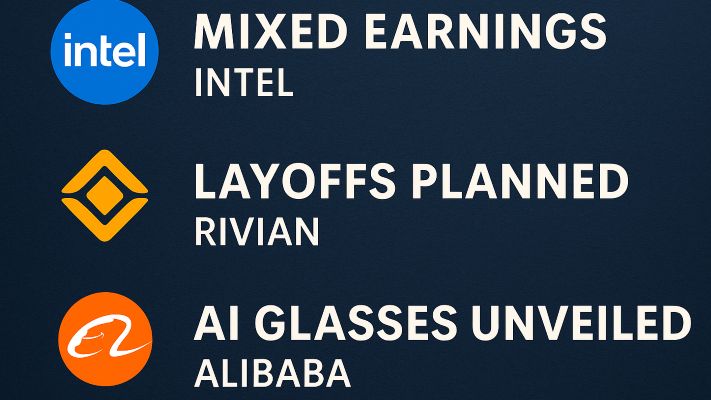AI Navigation
- articleAI Trends
- lightbulb_2AI Tips
- assistant_navigationAI Navigation
- heatHot Articles
- emergency_heat_2Hot Tips
- format_list_numberedPrompt Formatter
- psychologyTest Center(RPI)
October 24, 2025 · 24-Hour AI Briefing: Intel’s Earnings Show Mixed Recovery, Rivian Cuts Jobs, and Alibaba Unveils Its AI Glasses
In the past 24 hours, the global AI and tech landscape has once again seen major moves. Intel’s latest earnings show mild recovery amid fierce competition, Rivian initiates another round of layoffs to streamline operations, and Alibaba enters the AI wearable market with its first self-developed smart glasses.

1. Intel Reports Q3 2025 Earnings
Intel posted $13.65 billion in revenue for Q3 2025, up 2.8% year-over-year.
Client Computing revenue: $8.54 billion (+4.6%)
Data Center & AI revenue: $4.12 billion (−0.6%)
Foundry business revenue: $4.24 billion (−2.4%)
Gross margin climbed to 38.2%, beating the previous guidance of 34.1%. Total headcount dropped to 88,400, with plans to lay off another 13,400 employees.
Commentary: Intel continues to face intense competition in enterprise AI and cloud chips, with AMD and Nvidia aggressively eating into its market share. While the PC market shows early signs of recovery, the foundry segment remains sluggish. Ongoing layoffs indicate Intel’s focus on cost optimization and structural efficiency.
Despite signs of “bottoming out,” Intel still trails far behind in advanced foundry and data center AI chips. However, fresh capital injections from the U.S. government, SoftBank, and Nvidia could give Intel more strategic flexibility going forward.
2. EV Maker Rivian to Cut 4.5% of Workforce
Rivian announced plans to lay off around 600 employees, primarily affecting its marketing, vehicle operations, and sales divisions.
Commentary: The restructuring signals Rivian’s attempt to reduce costs and realign operations amid slower EV demand. The expiration of the $7,500 federal EV tax credit, combined with intensifying competition from legacy automakers and Tesla, has made survival harder for Rivian. The company’s winter ahead looks challenging.
3. Alibaba Launches Its First Self-Developed “Quark AI Glasses”
Alibaba unveiled its first self-developed Quark AI Glasses, now available for pre-order on Tmall for ¥3,999 (¥3,699 for 88VIP members). The glasses support navigation, Alipay payments, and Taobao price recognition, featuring a dual-battery design with hot-swappable modules. Shipping begins in early December.
Commentary: Powered by the Qualcomm AR1 flagship chip and a low-power coprocessor, the glasses run on Tongyi Qianwen and Quark AI, enabling multimodal recognition and semantic understanding. The product integrates the entire e-commerce experience—from recognition to payment—within one wearable device.
However, priced at nearly ¥4,000, it remains uncertain whether consumers are ready to embrace AI wearables at scale. Alibaba’s entry nonetheless demonstrates strong ambition in bridging AI technology with everyday life.
AI’s evolution continues to blur boundaries—from corporate restructuring and chip wars to the rise of consumer AI hardware. As competition deepens, the line between enterprise infrastructure and consumer experience grows thinner, and every move from tech giants reshapes the next wave of innovation.
For more cutting-edge AI updates, business insights, and technology trends, visit iaiseek.com
Check out what else happened in the AI world over the past 72 hours:
October 23, 2025 · 24-Hour AI Briefing: Tesla’s Earnings, Robotaxi Milestone, Amazon Tests AI Glasses, iPhone 17 Sales Momentum